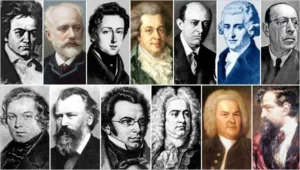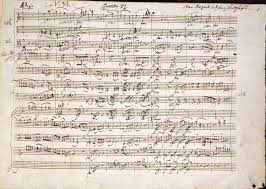Introduction
Wolfgang Amadeus Mozart, a name synonymous with classical music, was a prolific composer whose works have left an indelible mark on the world of music. Born in 1756 in Salzburg, Mozart’s musical prowess became evident at a very young age. His compositions, ranging from symphonies and operas to sonatas and concertos, have not only shaped the classical era but continue to influence music today. The importance of Mozart’s work in today’s music cannot be overstated. His timeless pieces continue to inspire musicians and delight audiences, underscoring his enduring relevance in the music world.
Early Life and Musical Beginnings
Mozart was born into a family with a strong musical background. His father, Leopold Mozart, was a renowned composer of his time, and it was under his guidance that Mozart began his journey into the world of music. Mozart’s introduction to music and early compositions began when he was just a toddler. By the age of five, he was already composing small pieces, and his talent for music was unmistakable.
In 1762, when Mozart was just six years old, his father took him and his elder sister, Maria Anna, on a concert tour to Munich and Vienna. This tour marked the beginning of Mozart’s performances as a child prodigy. His extraordinary talent for music, particularly his ability to play the piano and his improvisation skills, were celebrated everywhere they went. This early exposure to diverse musical environments played a crucial role in shaping Mozart’s musical style.
In the subsequent years, the Mozart family embarked on a second concert tour from 1763-66, which took them through the south of Germany, Paris, and London. These tours not only enhanced Mozart’s reputation as a musical prodigy but also exposed him to a wide range of musical styles and genres. This experience would later influence his compositions and contribute to the versatility observed in his works.
For more detailed information about Mozart’s life and works, you can visit this Detailed Biography of Mozart.
Career and Major Works
In 1781, Mozart embarked on a new chapter in his life when he moved to Vienna. This city, known for its rich musical culture, provided the perfect environment for Mozart to flourish as a composer. His time in Vienna was marked by a period of intense creativity, during which he composed some of his most well-known works.
Mozart’s major compositions span various genres, including symphonies, operas, sonatas, and concertos. Some of his most notable works include the operas “The Marriage of Figaro,” “Don Giovanni,” and “The Magic Flute,” the “Jupiter” Symphony, and the “Turkish” Violin Sonata. Each of these works showcases Mozart’s ability to blend complex musical structures with beautiful melodies. For a comprehensive list of Mozart’s works, you can visit this Complete List of Mozart’s Works.
Mozart’s unique style and his contributions to different music genres cannot be overstated. He had an uncanny ability to blend different musical forms and styles, creating works that were uniquely his own. His music is characterized by its melodic beauty, formal elegance, and emotional depth. His contributions to opera, in particular, have had a lasting impact, with his operas considered some of the greatest in the repertoire.
Personal Life
On a personal level, Mozart’s life was marked by both joy and hardship. In 1782, he married Constanze Weber, and together they had six children, though only two survived infancy. His marriage to Constanza was a source of much happiness, and she was a supportive partner throughout their life together.
Mozart’s personality traits and lifestyle were as unique as his music. He was known for his vivacious personality and his love of fun. Despite the many challenges he faced, including financial difficulties and health problems, Mozart maintained a positive outlook on life. His letters reveal a man with a keen sense of humor, a deep love for his family, and an unwavering dedication to his music.
Despite his extraordinary talent and contributions to music, Mozart’s life was not without its struggles. He often faced financial difficulties and struggled to find a stable position that would provide a steady income. However, through all the challenges, Mozart never lost his passion for music, and his legacy continues to inspire musicians and music lovers around the world.
Challenges and Struggles
Despite his prodigious talent and the acclaim he received for his work, Mozart’s life was not without its challenges and struggles. One of the most significant issues he faced was financial instability. Mozart’s income was often unpredictable, depending largely on commissions and performances. Despite his best efforts, he frequently found himself in debt.
In addition to his financial struggles, Mozart also grappled with health issues throughout his life. He suffered from various illnesses, some of which were quite severe and may have contributed to his early death.
Another challenge Mozart faced was finding stable employment and maintaining patronage. Despite his reputation as a brilliant composer, he struggled to secure a stable position at a royal court, a common source of income for musicians at the time. This struggle was partly due to his independent spirit and reluctance to conform to the expectations of patrons.
Mozart’s Death and Legacy
Mozart’s life was tragically cut short when he died in 1791 at the age of 35. The circumstances of his death and its aftermath have been the subject of much speculation and debate. While the exact cause of his death remains uncertain, it is generally believed that he died of a severe illness.
Despite his untimely death, Mozart left behind a legacy that has endured for centuries. His influence on future generations of composers is immeasurable. Composers such as Ludwig van Beethoven and Franz Schubert have cited Mozart as a significant influence on their work. For more on this, you can read about Mozart’s Influence on Beethoven.
Mozart’s music continues to be celebrated for its beauty, complexity, and emotional depth. His works are performed regularly by orchestras, chamber ensembles, and soloists around the world, and his operas are staples of the operatic repertoire. His music has also found its way into popular culture, featuring in movies, television shows, and advertisements.
In conclusion, while Mozart’s life was marked by challenges and struggles, his extraordinary talent and the body of work he left behind have ensured his place as one of the greatest composers in the history of Western music. His music continues to inspire, delight, and move audiences around the world, underscoring his enduring popularity and relevance.
Mozart in Popular Culture
Mozart’s influence extends far beyond the realm of classical music and into popular culture. His life and music have been the subject of numerous movies, TV shows, and literature, reflecting his enduring popularity and the fascination with his musical genius.
One of the most notable portrayals of Mozart is in the 1984 film “Amadeus,” which dramatizes the life of the composer and his rivalry with Antonio Salieri. The film, while not entirely historically accurate, offers a compelling portrayal of Mozart’s character and his extraordinary talent. It also features many of his most famous works, bringing his music to a wider audience.
Mozart’s music is also frequently used in modern media. His compositions have been featured in countless films, television shows, and commercials, often used to evoke a sense of elegance, sophistication, or classical beauty. From the use of his Symphony No. 25 in G minor in the opening scene of “Amadeus” to the playful use of “Eine kleine Nachtmusik” in various cartoons, Mozart’s music continues to resonate with modern audiences.
In conclusion, Mozart’s music and his life continue to captivate audiences, not only through traditional performances of his works but also through their incorporation into popular culture. This enduring popularity underscores the timeless appeal of his music and the lasting impact of his legacy.
Frequently Asked Questions
Why is Mozart considered a genius?
Mozart is considered a genius due to his extraordinary musical talent and his prolific output. He composed over 800 works in his short life, many of which are considered masterpieces of symphonic, concertante, chamber, operatic, and choral music. His compositions are noted for their melodic beauty, formal elegance, and emotional depth. Moreover, Mozart had a unique ability to blend different musical forms and styles, creating works that were uniquely his own.
What is Mozart’s most famous piece?
While Mozart composed numerous renowned pieces, one of his most famous works is the Symphony No. 40 in G minor. It is one of his last three symphonies and is admired for its intricate structure and the emotional depth of its music. Other notable works include his operas “The Marriage of Figaro,” “Don Giovanni,” and “The Magic Flute,” and his Requiem Mass in D minor.
Conclusion
Wolfgang Amadeus Mozart was a musical genius whose works have stood the test of time. Despite his short life and the many challenges he faced, he left behind a body of work that continues to inspire and delight audiences around the world. His influence on future generations of composers and his enduring popularity attest to his extraordinary talent and the lasting impact of his music. Mozart’s life and works serve as a testament to his genius, and his legacy continues to enrich the world of music.




